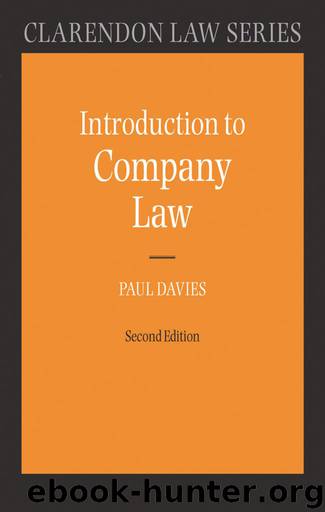Introduction to Company Law (Clarendon Law Series) by Davies Paul

Author:Davies, Paul [Davies, Paul]
Language: eng
Format: epub
Publisher: Oxford University Press, USA
Published: 2010-09-23T00:00:00+00:00
ENFORCEMENT
Since the statutory general duties of director are owed to the company, they are enforceable only by those who can claim to be the company or to act on its behalf. This clearly includes the board, but if the board contains the alleged wrongdoers, it may be unsafe to rely on it alone.115 Alternatively, it appears the shareholders as a body can initiate litigation against the wrongdoers.116 However, they may be loath to do this, if the alleged wrongdoers are major shareholders, especially as no ban of voting by interested directors applies when the question is not whether the wrongdoing should be ratified but whether the company should sue to enforce its rights. This gives rise to an issue of majority protection and in particular to the question of the appropriate role of the derivative claim, which I discuss in Chapter 8. However, even if there is no controlling shareholder but rather a large body of dispersed shareholders, it is likely that their collective action problems will prevent effective exercise by the shareholders of their power to initiate litigation. The directors may simply sit quiet, not seeking ratification nor in any other way to put the issue before the shareholders in general meeting. In this situation, the burden of convening a meeting falls on the shareholders and they may not be well placed to discharge, or even to secure the addition of an item to agenda of the annual general meeting. In short, the risk is that, in a substantial number of cases, the company will never give proper consideration to the question whether the wrongdoing directors should be sued, because they control the board and the shareholders’ meeting, in practice, does not consider the issue.
An obvious solution to this problem might be thought to be to empower individual shareholders to enforce the company’s rights. I discuss this technique in Chapter 8 in the context of minority shareholder protection. Suffice it to say here that, since the full panoply of directors’ duties is owed only to the ‘company’, individual shareholders have no right to enforce the company’s claims against errant directors and British law has traditionally been cautious in permitting such action (by way of ‘derivative’ claims). However, the 2006 Act may be producing change in that area.
Download
This site does not store any files on its server. We only index and link to content provided by other sites. Please contact the content providers to delete copyright contents if any and email us, we'll remove relevant links or contents immediately.
Cecilia; Or, Memoirs of an Heiress — Volume 1 by Fanny Burney(32554)
Cecilia; Or, Memoirs of an Heiress — Volume 2 by Fanny Burney(31951)
Cecilia; Or, Memoirs of an Heiress — Volume 3 by Fanny Burney(31935)
The Lost Art of Listening by Michael P. Nichols(7500)
Asking the Right Questions: A Guide to Critical Thinking by M. Neil Browne & Stuart M. Keeley(5766)
We Need to Talk by Celeste Headlee(5610)
On Writing A Memoir of the Craft by Stephen King(4938)
Dialogue by Robert McKee(4392)
Pre-Suasion: A Revolutionary Way to Influence and Persuade by Robert Cialdini(4226)
I Have Something to Say: Mastering the Art of Public Speaking in an Age of Disconnection by John Bowe(3886)
Elements of Style 2017 by Richard De A'Morelli(3344)
The Book of Human Emotions by Tiffany Watt Smith(3307)
Fluent Forever: How to Learn Any Language Fast and Never Forget It by Gabriel Wyner(3081)
Name Book, The: Over 10,000 Names--Their Meanings, Origins, and Spiritual Significance by Astoria Dorothy(2987)
Why I Write by George Orwell(2948)
Good Humor, Bad Taste: A Sociology of the Joke by Kuipers Giselinde(2946)
The Art Of Deception by Kevin Mitnick(2802)
The Grammaring Guide to English Grammar with Exercises by Péter Simon(2742)
Ancient Worlds by Michael Scott(2683)
